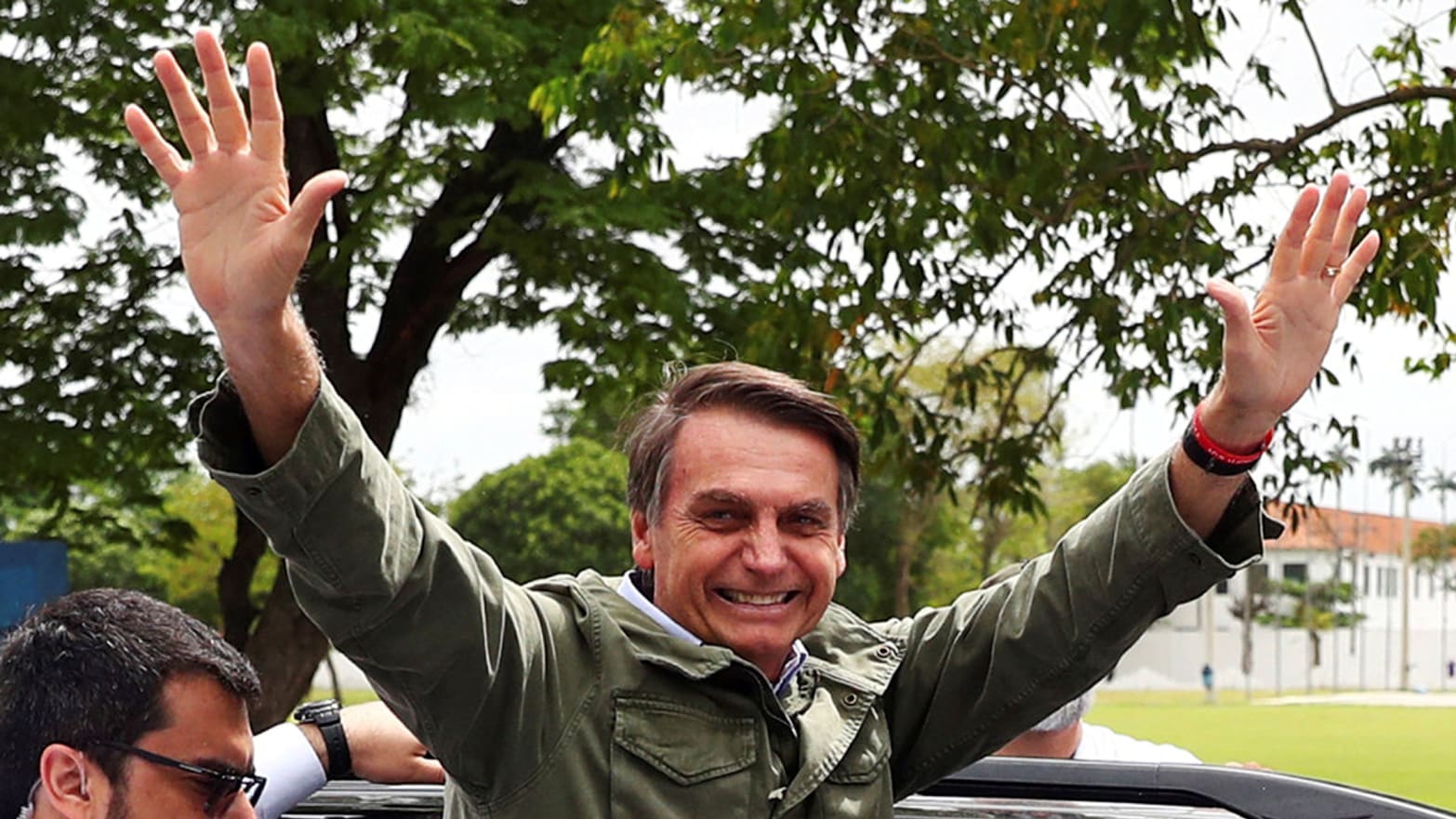Lots of the international media coverage of the rise of Jair Bolsonaro has lazily branded him Brazil’s answer to Donald Trump. But the truth is Bolsonaro, who swept to election victory Sunday night, is much more extreme. The far-right has conquered the world’s fourth biggest democracy, and the consequences of that will stretch far beyond Brazil.
During a bitter election campaign between Bolsonaro and Fernando Haddad of the left-wing Workers’ Party, each candidate claimed that the other would destroy Brazil. On Sunday, Bolsonaro’s vision—of eradicating corruption, driving down crime, and promoting traditional family values—led him to victory, with 55.2 percent of counted votes to 44.8.
One fair comparison with Trump’s victory is, on Monday morning, that one half of the country was elated and the other devastated. During Bolsonaro’s 27-year career as a congressman, the far-right politician has been known for celebrating the brutal military dictatorship that ruled Brazil for two decades and for repeatedly attacking the country’s black, gay, and indigenous communities. He will now be their president.
In the past, he’s told a female representative in congress that she was too ugly for him to rape, and he’s publicly admitted that he’d rather have his son die in a car crash than be gay. He’s backed torture; said he’d have to kill 30,000 people to get the country back on track; and claimed having a daughter was a personal “moment of weakness.”
Bolsonaro has also dismissed a black settlement in Brazil founded by the descendants of slaves as “not even good for procreation,” and has referred to black activists as “animals” who should “go back to the zoo.”
So why have 58 million Brazilians voted for a racist, homophobic, misogynist with a history of backing the military dictatorship that ruled Brazil with systematic torture and extra-judicial killings until the 1980s?
Some of the reasons can be linked to the global wave of populism that saw Trump elected. Bolsonaro relies on disinformation, attacking minorities, and has promised to make Brazil “great” again by carrying out a “cleanse” of its corrupt establishment elites—Brazil’s very own “swamp.”

Elba Ribeiro, a social worker from Belo Horizonte who voted for Bolsonaro (and who is distantly related to one of the authors of this article by marriage), told The Daily Beast: “I support him because he’s an honest guy with a firm grip. He represents the liberation of a country that has been suffering under so much corruption, from so much thievery. He removes definitively the possibility of the communist wave in Latin America reaching Brazil.”
Similarly to Trump, Bolsonaro’s campaign pushed what his opponents referred to as an “industry of lies.” Reports claimed he received illegal help from a group of Brazilian entrepreneurs who bankrolled a multimillion-dollar campaign to push out millions of messages via WhatsApp with false claims about Brazil and his election opponent Haddad.
But while similarities to Trump’s victory or the Brexit vote in the U.K. are obvious, Bolsonaro’s victory is uniquely Brazilian. Brazil’s recent economic decline, frightening rates of homicide and theft, and widespread political corruption gave Bolsonaro—a military man with no party affiliation, allowing him to act the outsider—the perfect breeding ground.

Brazil is one of the most violent countries in the world: 61,619 homicides were committed in 2017—that’s 170 people killed every day, including a young black man every 23 minutes.
“I support Bolsonaro because we are living in a country where the left is in control,” said Marilda Mendes, a visiting social worker for Brazil’s Happy Child program from Itaipé, Minas Gerais. “They have disarmed the good citizens and left the criminals armed to terrorize the population... My candidate is opposed to all this. He wants to see the citizen do well and go about his business without any fear of criminals freely roaming the streets.”
Brazil’s politics has been in turmoil since the impeachment of its first female president, Dilma Rousseff, just over two years ago. She was thrown out of office as a result of a sharp economic decline—which turned into Brazil’s worst ever recession—and a massive bribery scandal that implicated almost all the major parties, destroying trust in Brazil’s established politics.
Marcelo Augusto Tavares Ribeiro, an airline pilot (who is distantly related to one of the authors of this article by marriage), said: “Life in Brazil is not easy. Seeing a good part of your hard-earned money get taken with no improvements in health care and education for the country is sad. For many years, people with no education, no knowledge, and no academic credentials dictated the outcomes for Brazil. But they only brought down the development of the country.”
He added: “I don’t believe Bolsonaro will save the country. I do believe that he’ll start to clean it up so that the true Brazilian nation can rise again.”
Bolsonaro’s chances of victory were boosted by the imprisonment of popular former President Luiz Inácio Lula da Silva—known as Lula. The former trade union leader was swept to power with his Workers’ Party in 2003 to enact a raft of socialist reforms. His revolutionary political aspirations eventually soured, but he was still leading election polls this year despite serving a 12-year prison sentence for corruption and money laundering, which electoral judges ruled made him ineligible to run for president.
Haddad was his far weaker successor.
All of these factors—Bolsonaro’s populist message, a disinformation campaign, Brazil’s economic crises, its crime rate, the collapse in the people’s trust in politicians, and the imprisonment of his main rival—have led to a far-right takeover of one of the world’s newest democracies.
Italy’s far-right interior minister, Matteo Salvini, has already offered his congratulations to Bolsonaro, tweeting: “Even in #Brazil the citizens have sent the left packing!” The Brazilian president-election also revealed Trump called to wish him good luck after his victory, describing the U.S. president as “obviously a very friendly contact.”
Trump later tweeted about his “excellent call” with Bolsonaro, saying: “Had a very good conversation with the newly elected President of Brazil, Jair Bolsonaro, who won his race by a substantial margin. We agreed that Brazil and the United States will work closely together on Trade, Military and everything else!”
Bolsonaro has been characterized as the “Trump of the Tropics”—a copycat replication of the U.S. president. But for Brazil’s women, minorities, and its stability—as well as the shot in the arm it could give the far-right around the world—he could turn out to be far worse.

